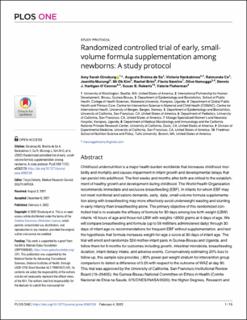| dc.contributor.author | Ginsburg, Amy Sarah | |
| dc.contributor.author | de Sa, Augusto Braima | |
| dc.contributor.author | Nankabirwa, Victoria | |
| dc.contributor.author | Co, Raimundo | |
| dc.contributor.author | Murungi, Joanitta | |
| dc.contributor.author | Kim, Mi-Ok | |
| dc.contributor.author | Brim, Rachel | |
| dc.contributor.author | Namiiro, Flavia | |
| dc.contributor.author | Namugga, Olive | |
| dc.contributor.author | Hartigan-O'Connor, Dennis J. | |
| dc.contributor.author | Roberts, Susan B. | |
| dc.contributor.author | Flaherman, Valerie | |
| dc.date.accessioned | 2022-12-28T12:29:56Z | |
| dc.date.available | 2022-12-28T12:29:56Z | |
| dc.date.created | 2022-05-18T14:42:26Z | |
| dc.date.issued | 2022 | |
| dc.identifier.issn | 1932-6203 | |
| dc.identifier.uri | https://hdl.handle.net/11250/3039648 | |
| dc.description.abstract | Childhood undernutrition is a major health burden worldwide that increases childhood morbidity and mortality and causes impairment in infant growth and developmental delays that can persist into adulthood. The first weeks and months after birth are critical to the establishment of healthy growth and development during childhood. The World Health Organization recommends immediate and exclusive breastfeeding (EBF). In infants for whom EBF may not meet nutritional and caloric demands, early, daily, small-volume formula supplementation along with breastfeeding may more effectively avoid underweight wasting and stunting in early infancy than breastfeeding alone. The primary objective of this randomized controlled trial is to evaluate the efficacy of formula for 30 days among low birth weight (LBW) infants <6 hours of age and those not LBW with weights <2600 grams at 4 days of age. We will compare breastfeeding and formula (up to 59 milliliters administered daily) through 30 days of infant age vs recommendations for frequent EBF without supplementation, and test the hypothesis that formula increases weight-for-age z-score at 30 days of infant age. The trial will enroll and randomize 324 mother-infant pairs in Guinea-Bissau and Uganda, and follow them for 6 months for outcomes including growth, intestinal microbiota, breastfeeding duration, infant dietary intake, and adverse events. Conservatively estimating 20% loss to follow up, this sample size provides ≥80% power per weight stratum for intervention group comparison to detect a difference of 0.20 with respect to the outcome of WAZ at day 30. This trial was approved by the University of California, San Francisco Institutional Review Board (19–29405); the Guinea-Bissau National Committee on Ethics in Health (Comite Nacional de Etica na Saude, 075/CNES/INASA/2020); the Higher Degrees, Research and Ethics Committee of Makerere University (871); and the Uganda National Council of Science and Technology (HS1226ES). We plan to disseminate study results in peer-reviewed journals and international conferences. | en_US |
| dc.language.iso | eng | en_US |
| dc.publisher | PLOS | en_US |
| dc.rights | Navngivelse 4.0 Internasjonal | * |
| dc.rights.uri | http://creativecommons.org/licenses/by/4.0/deed.no | * |
| dc.title | Randomized controlled trial of early, small-volume formula supplementation among newborns: A study protocol | en_US |
| dc.type | Journal article | en_US |
| dc.type | Peer reviewed | en_US |
| dc.description.version | publishedVersion | en_US |
| dc.rights.holder | Copyright 2022 The Author(s) | en_US |
| dc.source.articlenumber | e0263129 | en_US |
| cristin.ispublished | true | |
| cristin.fulltext | original | |
| cristin.qualitycode | 1 | |
| dc.identifier.doi | 10.1371/journal.pone.0263129 | |
| dc.identifier.cristin | 2025310 | |
| dc.source.journal | PLOS ONE | en_US |
| dc.relation.project | Norges forskningsråd: 223269 | en_US |
| dc.identifier.citation | PLOS ONE. 2022, 17 (2), e0263129. | en_US |
| dc.source.volume | 17 | en_US |
| dc.source.issue | 2 | en_US |

